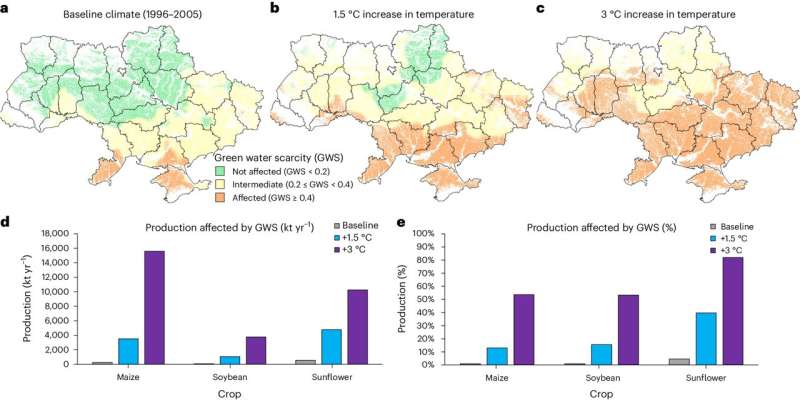This article has been reviewed according to Science X's editorial process and policies. Editors have highlighted the following attributes while ensuring the content's credibility:
fact-checked
peer-reviewed publication
trusted source
proofread
Sustainable irrigation critical to recovery of Ukrainian farms, a major global exporter of grain and oilseeds

By the middle of the century, three-quarters of Ukrainian croplands—a critical source of the world's grain and oilseeds—will experience water shortages due to the combination of climate change and infrastructural damage caused by the Russian invasion, according to new research from an international research team led by Carnegie Science's Lorenzo Rosa and including members of the World Bank's Global Water Practice unit.
However, there's hope. The team's work, published in Nature Food, shows that leveraging local water resources for sustainable irrigation strategies could significantly improve the nation's ability to recover from the invasion and prepare for future climate scenarios.
Prior to the 2022 invasion, Ukraine played a critical role in global food security. It was the world's third-largest exporter of rapeseed—which is used for its popular culinary oil—fourth-largest maize exporter, and fifth-largest wheat exporter. The disruption to agricultural activities caused by the conflict has led to losses of at least $80 billion and food shortages in the Middle East and Africa.
The vast majority of Ukraine's fields are dependent on rainfall as their only source of water. Prior to the invasion, less than two percent of the nation's cropland received irrigation and this has been further cut by infrastructural damage due to the conflict.
"The destruction last June of the nation's main irrigation source, Kakhovka Dam, was particularly damaging to agricultural productivity," Rosa explained. "The impact of the invasion on agriculture compounds the effects of climate change. We quantify these impacts and point to potential solutions to address these challenges."
The situation makes Ukrainian agriculture particularly susceptible to climate change—which is expected to increasingly shift precipitation patterns and affect growing seasons—and poses challenges for short-, medium-, and long-term planning by farmers and land managers.
Rosa's research team—which included Silvan Ragettli of Hydrosolutions GmbH; Ranu Sinha, Winston Yu, and Poolad Karimi of the World Bank; and Olga Zhovtonog of the Ukraine's National University of Water and Environmental Engineering—set out to quantify these threats and evaluate the nation's path to agricultural resilience.
They found that about 10% of Ukrainian croplands are susceptible to water scarcity, which could be exacerbated by rising temperatures and precipitation changes. Under a 1.5°C global temperature increase, insufficient rainfall could affect 41% of Ukraine's farmland, a figure that increases to 77% under 3°C of warming.
"Developing effective water management strategies is essential for preventing a major decline in crop yields in the coming decades," Rosa said. "We've found that up to 18 million hectares of land are suitable for expanding irrigation using local surface and groundwater sources."
The researchers showed that water infrastructure will need to be upgraded to meet the growing demand, and recommended Ukraine pursue decentralized solutions to avoid the food security risks and high energy costs posed by re-creating the Kakhovka Dam or a similarly vast reservoir.
"Our findings underscore the urgent need to invest in rehabilitating and modernizing Ukraine's irrigation sector to enhance agricultural resilience and productivity, thereby addressing economic stability and global food security," Rosa indicated.
The research team says their work can inform national water resources management and infrastructure investment strategies during post-invasion recovery in Ukraine.
More information: Lorenzo Rosa et al, Regional irrigation expansion can support climate-resilient crop production in post-invasion Ukraine, Nature Food (2024). DOI: 10.1038/s43016-024-01017-7
Journal information: Nature Food
Provided by Carnegie Institution for Science





















